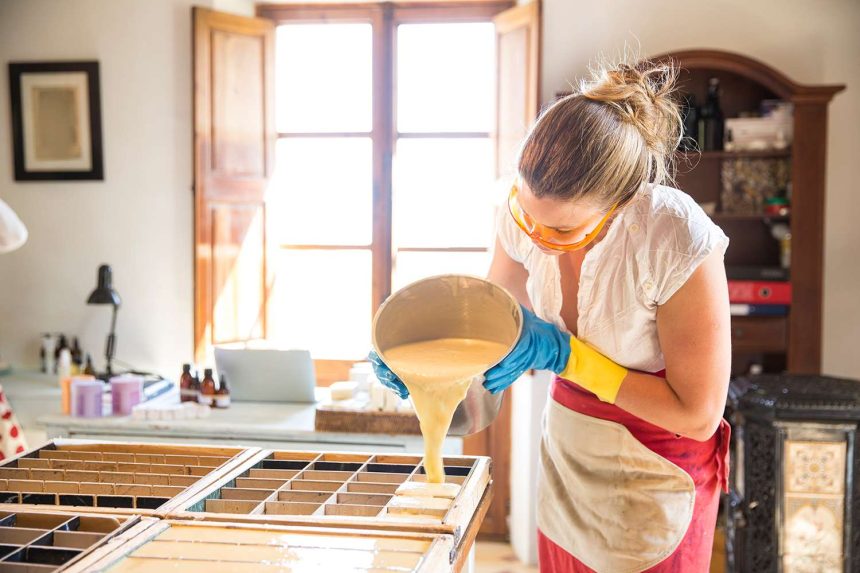Whether you’re making soap for personal use or starting a small home business, you need high-quality supplies. Soap making supplies vary depending on the production technique you choose. The melt-and-pour process is the easiest for beginners. This method involves melting premade soap bases, adding essential oils and add-ins, pouring the mixture into a mold, and letting it harden. Another process is the hot and cold method. Here’s an overview of all supplies you need to make soap:
1. Soap Bases
Soap bases are the primary ingredients in your soap making supplies. Soap bases contain water, lye (sodium hydroxide), glycerin, and oil, which are the basic ingredients you need to make soap. You can find many melt-and-pour soap bases, including shea butter, honey, oatmeal, olive oil, and coconut milk. Goat milk and hemp oil are also popular options.
Soap bases can feature essential oils, fragrances, and colorants, but most only contain the basic ingredients. You can choose bases with animal or vegetable fat. Liquid soap bases are also available for shower gels, body wash, shampoos, and conditioners. You can make soap bases from scratch or purchase quality options from an online vendor.
2. Oils and Additives
Homemade soaps can feature different additives, including essential oils, fragrances, and dried botanicals. Fragrances, oils, and additives are optional but are great ways to customize your soaps. Melt and pour soap base fragrance oils come in different scents and preferences, including fruity, floral, spicy, and earthy.
You can use vanilla, lavender, jasmine, cedar, leather, rum, rose, chamomile, frankincense, eucalyptus, and more. These fragrances may be available as concentrated oils. You can also order dried botanicals, including lavender flowers, rose buds and petals, peppermint leaves, lemon peels, cornsilk, and more. The oils and additives can provide extra skincare benefits.
3. Molds and Cutters
Soap making molds come in different shapes, sizes, and materials. Plastic and silicone molds are the most popular, but you can also find wooden loaf molds. The option you choose depends on your needs. Basic molds produce loaves that you can cut into smaller pieces using soap cutters. You can also find decorative molds.
If you plan to sell the soap, go for store-bought molds that won’t react with your products. You can produce different shapes, including square, rectangle, round, and custom designs. Some molds produce one large loaf, while others let you create several bars simultaneously. Soap cutters also come in straight or wavy options.
4. Soap Colors and Seeds
Color selection is another decision you can make with regard to soap making supplies. All natural mica colors are great and don’t migrate in the soap, but they can be challenging to work with. You can choose conventional colors for uniform soaps. Some colors migrate between layers and are not ideal for layering, so make sure you find the right option.
Apothecary stores offer a wide variety of bright, vibrant color bars. A few unique colors include cobalt blue, lavender purple, woodland or teal green, and more. You can also use chia, fenugreek, sesame, fennel, cardamom, nigella, cumin, celery, and other natural seeds. They add texture and add exfoliation properties to your soap.
5. Miscellaneous Supplies
Soap making involves many other supplies you can use to customize and improve your product. If you’re using organic oils, consider natural preservatives like grapefruit seed extract, tocopherols, and carrot root oil. Some soaps don’t require preservatives because they feature synthetic ingredients. If you must use preservatives, stick to natural options.
Making soap at home requires a thermometer, rubber spatula, rubbing alcohol, a heat-safe glass measuring cup, and a large bowl. You also need measuring spoons, a whisk, safety goggles, protective gloves, and a mask. Some supplies aren’t used in the soap but are necessary for safety and optimal production. Make sure you’re working in an open, well-ventilated area.
Order Your Soap Making Supplies Today
Finding soap making supplies can be simple thanks to online vendors. You can order all the supplies mentioned above from the comfort of your home. All you need is a reputable store that sells bulk supplies for apothecary products like soaps, shampoos, and candles. Leading stores sell everything from ingredients to equipment and books. You can also find packaging material if you plan to sell your soap. Shop at stores known for providing high-quality ingredients and supplies.














